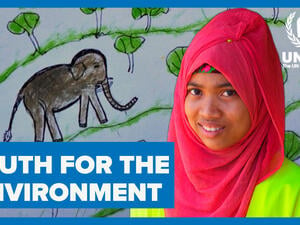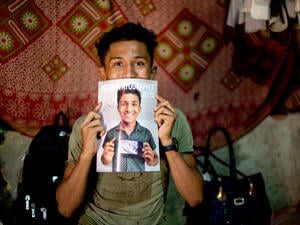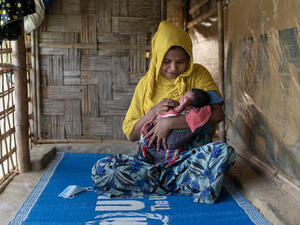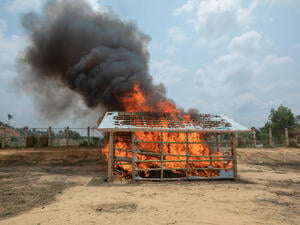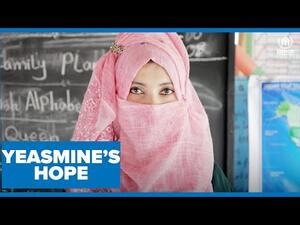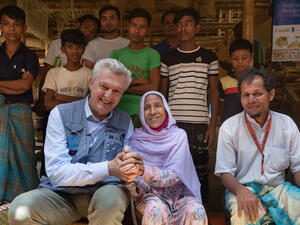UNHCR Deputy calls for enhanced access to education and livelihoods for Rohingya refugees in Bangladesh
UNHCR Deputy calls for enhanced access to education and livelihoods for Rohingya refugees in Bangladesh
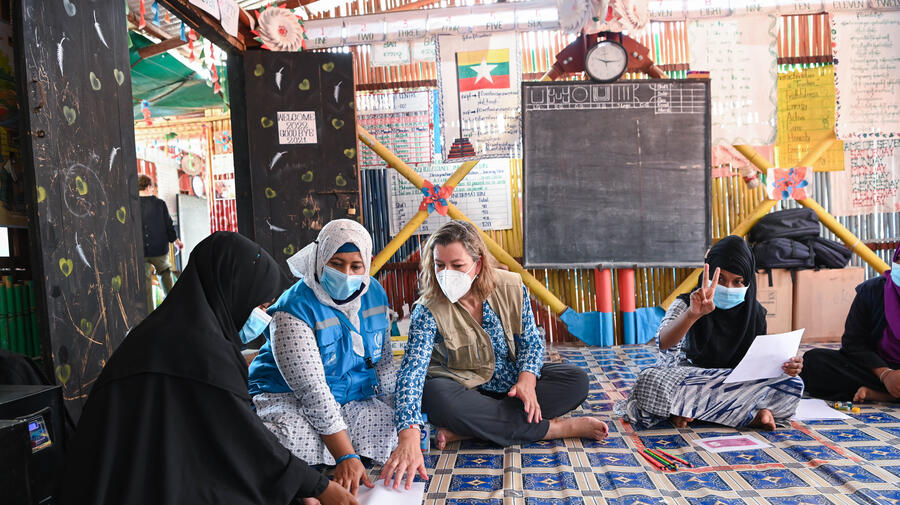
Deputy High Commissioner Kelly T. Clements (centre) meets a group of Rohingya refugee girls in Cox's Bazar, Bangladesh.
As the Rohingya crisis approaches its fifth year, Deputy High Commissioner for Refugees, Kelly T. Clements, called for continued international support for Rohingya refugees, and the government and people of Bangladesh. She reiterated UNHCR's commitment towards voluntary repatriation and other solutions, while underlining the need to build resilience and invest in refugees' capacities in preparation for a future safe and voluntary return to Myanmar.
The United Nations Deputy High Commissioner for Refugees Kelly T. Clements and UNHCR Director for Asia and the Pacific Indrika Ratwatte undertook a joint visit to Bangladesh from 13 to 18 February, which included visits to the refugee camps in Cox’s Bazar where some one million Rohingya refugees reside, as well as to the island of Bhasan Char, and meetings with senior Government officials, local and international partners.
Throughout their visit, the Deputy High Commissioner and Director for Asia and the Pacific reiterated their sincere appreciation to the Government and people of Bangladesh for hosting Rohingya refugees who have sought protection from violence and persecution in Myanmar. They emphasized the need to continue working towards voluntary, safe, dignified and sustainable return of Rohingya refugees to Myanmar while also advocating for a broader longer-term focus on education, skills development and livelihoods.
The delegation spoke with refugees to understand their needs and challenges, and the contributions they wish to make to their own future. “While refugees clearly express a desire to return home, they also feel their lives would be at risk if they did so today. Therefore, we also need to start working towards other solutions while redoubling efforts to provide access to education, skills training and livelihood opportunities for them and their generous host communities,” said Deputy High Commissioner Clements.
“The strong work of refugee volunteers throughout the pandemic – often as first responders – and support for their communities in the camps highlighted not only their dedication and capacity, but the opportunity to incorporate those skills into more innovative initiatives such as environmental protection,” observed Mr. Ratwatte. “Providing youth with more learning opportunities, tools and skills will allow them to build peaceful communities and contribute to a safe environment.”
Despite the challenges of the COVID-19 pandemic, Government and UNHCR officials noted the positive strides to support the Bangladeshi communities hosting refugees, which includes the establishment of COVID and other specialized health facilities in Cox’s Bazar town and Ukhiya upazila, as well as the first large-scale water provision and distribution scheme in southern Teknaf that will provide safe water to more than 225,000 people.
On their first visit to Bhasan Char, the delegation recognized the positive work being done by the Government and local civil society partners on the island. “Bhasan Char has the potential to become a temporary stay for the Rohingya refugees, and there has been clear improvement in the conditions and availability of services since UNHCR and UN partners began supporting the Government in October. However, its sustainability will depend on scaling up health and education services, improving access to livelihoods and income generating activities, and above all, continuing to ensure the voluntariness of relocations to the island and regular family visits to and from the mainland,” said Ms. Clements.
With return to Myanmar unlikely in the immediate future, the visit underscored the need for a more comprehensive approach to humanitarian support. This includes alternative solutions for Rohingya refugees such as resettlement to third countries for the most vulnerable with specific protection needs, and complementary pathways overseas which could include employment and educational opportunities.
UNHCR reaffirmed its commitment to continue to support both Bangladeshi and Rohingya communities, while calling on the international community to stand by the Government and people of Bangladesh until the situation in Myanmar allows for a safe, dignified, and sustainable return.
Broll: see here.
For more information please contact:
- In Bangladesh: Regina de la Portilla, [email protected], +88 01847 327 279

